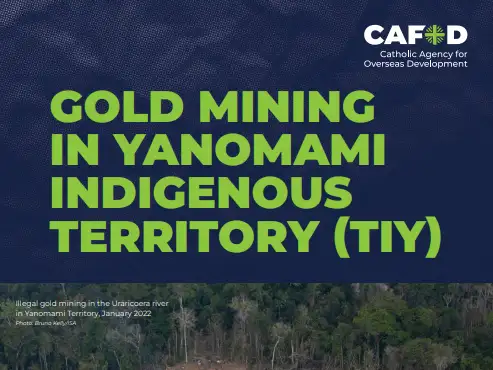

Credit: Bruno Kelly/ISA
lllegal and destructive gold mining is growing on an alarming scale in Yanomami Indigenous Territory (TIY) in the Brazilian Amazon.
CAFOD’s new report - based on research conducted by our partners, Hutukara Yanomami Association (HAY) and Socio-environmental Institute (ISA) - outlines the scale of human rights abuse faced by the Yanomami and Ye’kwana people.
This includes:
the assault and injury of indigenous people
increased cases of malaria and other infectious diseases
the poisoning of water and food sources by mercury, which is used by miners to extract gold from the earth.
Sixteen thousand indigenous people have been impacted by disease, violence, murders and displacement. The situation is so dangerous for our partners in Brazil that we weren’t able to name any individuals or show their faces, in order to protect their identities.
The forest that indigenous communities protect and depend on is fast disappearing
Between 2018 and 2022, the area destroyed by mining in TIY is estimated to have reached more than 5,000 hectares – equivalent to over 7,000 football pitches.
A number of factors have contributed to the rapid increase in illegal mining
Mining is mostly conducted by small-scale, or 'wildcat' miners, who collude with local gangs, politicians and business lobbyists. This previous 'artisan' trade has become a highly sophisticated, global operation, incentivised by high profits and the high international demand for gold.
Ineffective regulation in Brazil allows the laundering of gold and the obscuring of its origins, and there is little accountability for gold buyers. Much illegal gold from Brazil finds its way onto international markets.
Gold is traded in the UK and is found in products we use every day, including jewellery and electronics.
It’s very difficult to tell whether any of it is illegally mined in Brazil. The gold supply chain is very opaque, gold passes through many different stages on its way to being refined, and gold from different sources is mixed. But we do know that a high proportion of gold from Brazil is illegal and that the UK imports a high volume of gold from Brazil.
So, the gold that circulates on UK markets could be connected to human rights and environmental destruction in Brazil. In fact, illegal gold from the Brazilian Amazon has already been linked to international jewellery and electronics companies, including Apple, Google, Microsoft and Amazon.
In addition, the certification standards that the UK hosts - such as the London Bullion Market Association’s 'Responsible Sourcing' programme and the Responsible Jewellery Council - are currently certifying gold from mines that have been linked to human rights abuse.

Gold Mining in Yanomami Indigenous Territory
This briefing outlines the scale of human rights abuse and environmental destruction caused by illegal gold mining in Yanomami Indigenous Territory, in the Brazilian Amazon, and outlines recommendations for the UK government and British businesses to tackle this issue.
Action is needed both in Brazil and internationally - the UK has a role to play
The Brazilian government, under new president Luiz Inácio Lula da Silva, has already taken initial steps to tackle illegal mining in Yanomami Indigenous Territory by launching a police operation to remove illegal miners - and much more needs to be done.
But it also faces a huge challenge due to the scale of the issue. The international community needs to support the Brazilian government’s actions and simultaneously to take action to tackle the international trade in illegal gold. At the moment, this action is simply not happening.
The UK government should support the Brazilian government in these efforts and introduce stronger legislation to tackle abuse in UK supply chains. UK businesses should enhance their due diligence, increase traceability and transparency in their supply chains, and commit not to source gold from Brazil until the Brazilian government has taken further steps to address illegal mining.
It’s not enough to turn a blind eye – UK companies need to ensure they do not contribute to or profit from destructive gold mining.

